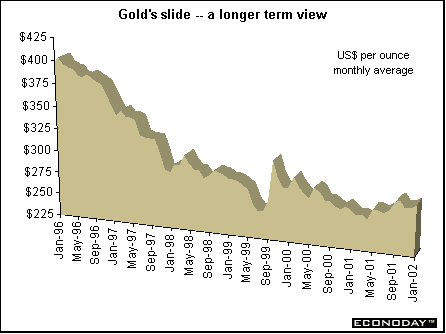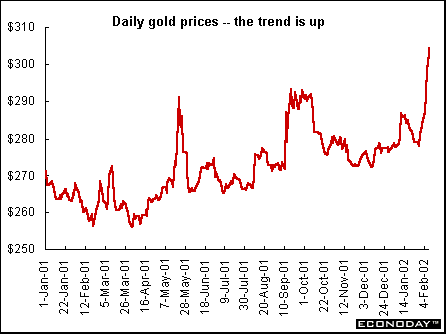Gold is often considered the ultimate safe haven in times of uncertainty. Even in recent history, gold prices
soared in the months prior to the year 2000 when concerns were high whether computers would be able to
cope with the century change. Similarly, in the days immediately after the September 11 tragedy, gold prices
rose until the markets sorted out risks.
Yet in recent years the gold market has seen only a few rallies over $300 per ounce and all were short lived.
The U.S. dollar seemingly had replaced gold and was considered a safe haven for risk averse investors. As
other investment products came into wider use, gold lost even more of its luster as a dollar alternative. But
once again, there is a stirring in the gold market. What is causing gold prices to rise now and why should
investors care?

Political uncertainty
Despite a brief lift after the attack on the United States and the war in Afghanistan, gold quickly slipped back
to its former level by mid-October amid investor patriotism for U.S. assets. Gold has only begun to rise again
in the past few weeks as Argentina's default has heightened the premium for safe havens and protection from
risk.
Weakening investor confidence
The recent rise in the gold price to $306 per ounce - its highest level since February 2000 - is seen as
symptomatic of a wider trend. There are tentative signs that problems in corporate America as exemplified by
Enron could be eroding confidence in U.S. companies. This has triggered a flight to quality among some
investors and the rise in the gold price. In recent years gold has lost much of its appeal with private investors
because of innovations from the financial services industry, which has developed a range of alternative and
effective safe-haven investment vehicles.

Japan's woes and changing deposit guarantees
Traditionally, gold is bought as a hedge against inflation. However, that certainly is not the case in Japan
where deflation has been rampant for over two years. With banks battling a recession and bad loans, some
Japanese are worried about the imminent end of a blanket guarantee on their savings and are sinking their
money into something that looks more solid - gold. The Japanese government has offered an unlimited
guarantee on bank deposits since shortly after the 1997-98 financial crisis, which toppled major banks and
set off fears of a nationwide run on banks. But come April, it will only insure selected types of bank deposits,
totaling about $4 trillion nationwide. As a result, larger accounts have been shrinking gradually. Sales of
$10,000 gold bars in downtown Tokyo have more than doubled in the past several months. Some customers
have bought as many as 40 of the 2.2-pound bars as they seek a safe haven.
Less production
South Africa's AngloGold Ltd. and some other producers are reducing the amount of borrowed gold they sell
as a hedge against falling prices. Speculators fueled this week's rally, repurchasing futures contracts they had
sold on prior expectations that gold would head lower. Gold could be rising because speculators are
concerned that the lack of producer selling may stabilize the market at a higher level.
Sales by central banks
One of the reasons gold prices have failed to rebound in the long term is the relentless selling by the world's
central banks. The collapse in the early 1970s of the Bretton Woods agreement - under which governments
agreed to back their currencies with gold - removed the primary rationale for central banks to hold gold. But it
took until 1999 before a rush by several central banks to offload gold led to the Washington Accord, in which
15 European central banks agreed to sell no more than 400 tons a year. The accord has been honored, but
there is evidence that central banks have been selling as much gold as they can under its terms.
Bottom Line
It is not unexpected to see gold prices rally during economic downturns and when investor confidence is
shaken. And given the recent political and economic upheavals it is not surprising to see the price of gold
rise. Gold is still considered the ultimate hedge and functions as a store of value when rising inflation is
destroying savings or when falling asset prices are destroying investment values.
Why are investors turning to gold now? The spot gold market has risen over six percent so far in February
alone. And for the first time in two years, the price peaked above the $300 psychological resistance level,
which it had not done even after September 11. According to the Gold Council, the gold price has climbed
because the dollar, yen and euro are all under varying degrees of pressure and the equity markets are
showing signs of stress. Adding to the mix is tremulous investor sentiment, shaken by earnings and
accounting quality problems. Perhaps investors are simply spreading their risk given the perceived risks of
other assets.
Anne D. Picker, International Economist, Econoday
| 